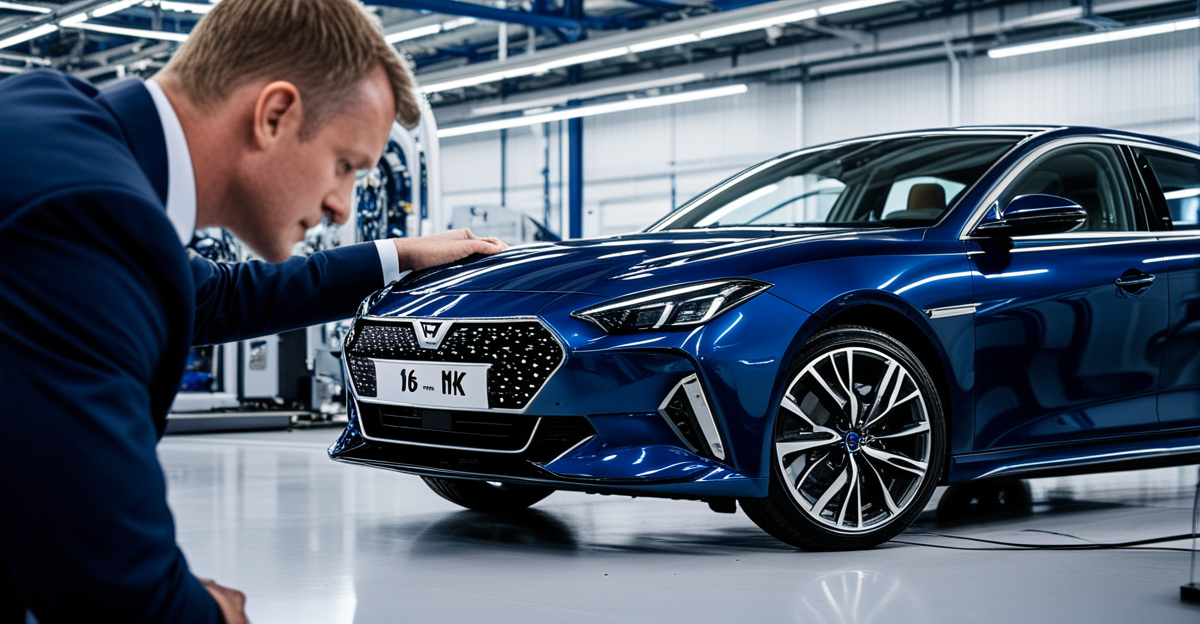Innovations Transforming UK Automotive Manufacturing
The UK automotive manufacturing sector is undergoing a significant transformation driven by several key innovations that promise to redefine the industry’s future. At the forefront is the rise of electric vehicles (EVs), which is reshaping market demands and driving extensive research in battery technology. These advances improve energy density, charging speed, and overall vehicle range, crucial factors positioning the UK as a leader in sustainable mobility.
Simultaneously, the growth of autonomous and connected car technology is introducing new layers of complexity and opportunity. The integration of sensors, advanced software, and vehicle-to-everything (V2X) communication enables safer, more efficient driving experiences. These developments require collaboration between traditional automakers and tech companies, showcasing the UK’s innovative ecosystem.
Also to read : What Innovations Will Shape the Future of UK’s Automotive Industry?
Beyond the vehicles themselves, the adoption of advanced manufacturing processes plays a pivotal role. The use of artificial intelligence, robotics, and digital tools such as digital twins streamlines production, enhances quality control, and reduces waste. UK manufacturers are embracing Industry 4.0 technologies to boost flexibility and responsiveness, key advantages in a competitive global market.
Together, these innovations are shaping sustainable, connected, and digitally enhanced automotive manufacturing, positioning the UK for future growth.
Have you seen this : What Will Be the Future of Electric Vehicles in the UK?
Impact of Electric Vehicles and Battery Advancements
Electric vehicles (EVs) have become a cornerstone of UK automotive manufacturing’s shift toward sustainable mobility. Key innovations in battery technology enhance energy density and shorten charging times, directly addressing range anxiety—one of the main barriers to EV adoption. The UK is investing heavily in EV infrastructure, including gigafactories dedicated to battery production. This industrial expansion supports the nation’s goal to phase out petrol and diesel cars by 2030.
Government strategies play a vital role, offering incentives and establishing regulations to accelerate EV uptake and reduce emissions. Collaboration between established automakers and tech companies drives rapid innovation, combining automotive expertise with cutting-edge battery and software advancements. For example, partnerships focus on developing solid-state batteries, promising higher capacity and improved safety.
Such efforts not only position the UK as a leading EV manufacturing hub but also foster a competitive supply chain. Increased local battery production reduces dependency on imports, enhancing resilience. Consequently, electric vehicles and advancements in battery technology are central to the UK’s vision for a cleaner, more efficient automotive future.
Autonomous Technology and Connected Systems
The development of autonomous vehicles is a pivotal key innovation within the UK automotive sector. Rigorous testing of self-driving cars on public roads across urban and rural settings ensures safety and reliability. This hands-on approach generates valuable data critical for refining autonomous algorithms and sensor integration. How does the UK manage the intricate connectivity of these vehicles? The answer lies in the expansion of connected car technology network infrastructure, enabling vehicles to communicate with each other and with smart city systems in real-time.
This connected vehicle technology supports traffic management, reduces congestion, and enhances road safety. Importantly, UK manufacturers collaborate closely with leading research institutions and tech firms specializing in artificial intelligence and telecommunications. Such partnerships accelerate innovation cycles and foster development of vehicle-to-everything (V2X) communication protocols essential for seamless connectivity.
Together, autonomous and connected tech are forming the foundation of future mobility solutions in the UK, blending safety, efficiency, and convenience. Their integration within the UK automotive sector showcases the country’s commitment to remaining at the forefront of automotive innovation.
Advanced Manufacturing Processes and Digital Transformation
The UK automotive manufacturing sector is rapidly embracing advanced manufacturing techniques to boost productivity and innovation. Key innovations in this area include the integration of artificial intelligence (AI) and robotics on assembly lines. These technologies automate repetitive tasks, improve precision, and reduce human error. For example, AI-driven robots can perform complex welding or painting with consistent quality, increasing efficiency across production plants.
Moreover, UK manufacturers are utilising digital twins—virtual replicas of physical assets—to simulate and optimise manufacturing processes before actual implementation. This digitalisation reduces downtime and accelerates problem-solving by allowing engineers to predict bottlenecks or failures in real-time.
Data analytics also plays a crucial role. By analysing vast streams of production data, companies identify inefficiencies and adapt operations accordingly. Industry leaders in the UK are deploying these solutions to remain competitive globally.
Together, AI, robotics, and digital tools form the backbone of the UK’s advanced manufacturing strategy. These key innovations enable greater flexibility, responsiveness, and cost-effectiveness—essential for meeting evolving market demands and future trends in automotive production.
Sustainability and Green Initiatives in Production
Sustainability has become a core focus in UK automotive manufacturing, with green initiatives driving substantial change. To meet regulatory requirements and public demand, manufacturers are transitioning toward carbon-neutral factories. This includes implementing renewable energy sources, optimising energy consumption, and reducing emissions during production. Embracing a circular economy approach, companies prioritise the reuse and recycling of materials to minimise waste.
Sustainable materials, such as bio-based plastics and recycled metals, are increasingly integrated into vehicle components. This not only lessens environmental impact but supports innovation in design and manufacturing processes. UK automotive industry leaders invest in eco-friendly practices, including water conservation and waste reduction programmes tailored to each production site.
Government incentives encourage these green manufacturing efforts through grants and tax benefits, creating financial motivation alongside environmental responsibility. By adopting such sustainable production strategies, the UK automotive sector aligns with global future trends emphasizing environmental stewardship, ensuring competitiveness and resilience in an evolving market where sustainability is a critical success factor.
Supply Chain Innovation and Resilience
The UK automotive supply chain is undergoing significant transformation to enhance flexibility and resilience amid global uncertainties. Key innovations include localisation and reshoring strategies, aiming to reduce dependence on distant suppliers and mitigate risks from disruptions such as Brexit and semiconductor shortages. By bringing more manufacturing processes back to the UK, companies gain greater control and agility.
Digital supply chain management is another crucial advancement. It leverages real-time data analytics and traceability technologies, allowing manufacturers to monitor parts and inventory throughout production and distribution. This visibility improves decision-making, reduces delays, and optimises logistics.
In response to recent global challenges, UK manufacturers have accelerated investment in robust supply chain frameworks. This involves diversifying suppliers and adopting predictive analytics to anticipate shortages or disruptions before they escalate.
Together, these key innovations enable the UK automotive industry to maintain steady production and adapt swiftly to evolving conditions. Enhancing supply chain resilience not only safeguards manufacturing continuity but also supports the sector’s competitiveness in an increasingly volatile global market.
Leading UK Manufacturers and Industry Developments
The leading UK car manufacturers such as Jaguar Land Rover, Nissan, and Rolls-Royce play a crucial role in driving automotive innovation UK forward. These companies are at the forefront of adopting key innovations like electric powertrains, autonomous systems, and advanced manufacturing technologies. For instance, Jaguar Land Rover has invested heavily in electrification and connected car features, positioning itself for future trends in mobility.
Industry developments include active participation in consortia and government-funded innovation programmes aimed at fostering collaboration and accelerating research. These partnerships often involve academia and startups, enabling the translation of cutting-edge research into commercial applications. This collaborative R&D environment is vital for maintaining the UK’s competitive edge in a rapidly evolving global market.
Moreover, manufacturers continuously adapt to emerging challenges by upgrading production facilities and exploring new materials and technologies, reinforcing their commitment to innovation. The synergy between established OEMs and innovative enterprises exemplifies the dynamic landscape of the UK automotive manufacturing sector, securing its position as a hub for advanced vehicle development and sustainable growth.
Market Impact and Expert Perspectives
The evolving landscape of UK automotive manufacturing directly influences jobs, exports, and national competitiveness. Experts emphasize that the adoption of key innovations—including electric vehicles, autonomous systems, and advanced manufacturing—boosts productivity and creates high-skilled employment opportunities. For example, market analysts highlight that the expansion of EV production within the UK fosters new supply chains, enhancing export potential.
How do these developments impact the industry’s global standing? The answer lies in the UK’s ability to integrate emerging technologies rapidly and scale production efficiently, improving its competitive edge internationally. Government agencies and industry bodies provide forecasts projecting sustainable growth, especially as consumer demand shifts toward cleaner and smarter vehicles.
However, challenges remain. Experts caution that maintaining momentum requires continuous investment in R&D and workforce training to address skills gaps. Moreover, adapting to evolving regulations and market fluctuations is critical. Overall, industry observers are optimistic, viewing these technological strides as vital drivers for securing the UK’s position amid global automotive trends and future innovations.








